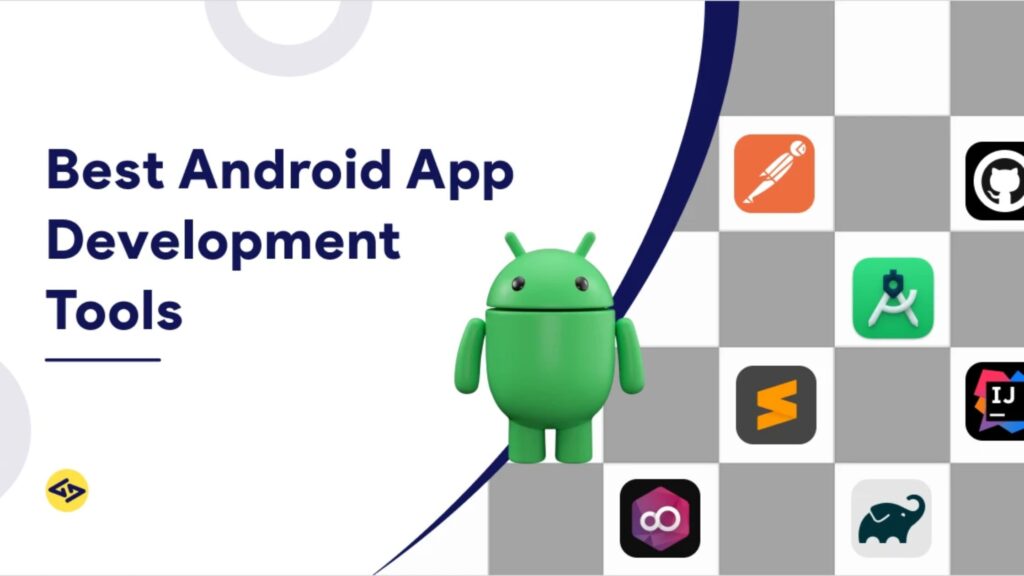Android app development with a course designed for students! Master coding, design, and publishing to create innovative mobile apps.

In today’s digital era, Android app development course have revolutionized the way we live, work, and interact. Android, being the most popular mobile operating system, powers billions of devices worldwide.
Whether you’re a student, professional, or entrepreneur, learning Android app development not only equips you with the skills to create innovative apps but also opens doors to career opportunities. Furthermore, it helps you stay ahead in tech.
Our Android App Development Course is designed to transform you into a skilled app developer, ready to conquer the tech world.
Why to Choose an Android App Development Course?
- High Demand: Android apps dominate the mobile app market with over 70% market share. Thus, they offer significant opportunities. Moreover, this dominance drives innovation.
- Global Reach: Develop apps for a massive audience, spanning smartphones, tablets, and more. In addition, this allows you to reach diverse users. Furthermore, it broadens your app’s impact.
- Lucrative Careers: Android developers are among the most sought-after professionals in the tech industry. As a result, they enjoy numerous career opportunities. Moreover, their skills are highly valued by employers.
- Creative Freedom: Build innovative apps that solve real-world problems. In addition, these apps can make a meaningful impact. Furthermore, they can enhance users’ daily lives.
Course Highlights
- Comprehensive Curriculum: Learn everything from the basics of Java/Kotlin to advanced Android frameworks. First, you’ll establish a strong foundation. Then, you’ll progress to more complex concepts.
- Hands-on Projects: Gain practical experience by developing real-world apps. Additionally, this hands-on approach enhances your skills. Moreover, it prepares you for real industry challenges.
- Expert Guidance: Learn from experienced instructors and industry professionals. In addition, they provide valuable insights. Moreover, their expertise helps you navigate real-world scenarios.
- Certification: Earn a globally recognized certificate upon course completion. As a result, you’ll enhance your resume. Moreover, this certification opens doors to new career opportunities.
- Flexible Learning: Choose between online and offline classes tailored to your schedule. Therefore, you can select the option that suits you best. Additionally, both formats offer flexible learning opportunities.
What You’ll Learn in Android App Development Course
- Android Fundamentals
- Introduction to Android Studio and SDK tools.
- Basics of Java and Kotlin programming languages.
- Understanding Android architecture and components.
- UI/UX Design
- Creating interactive and user-friendly app interfaces.
- Responsive design for various screen sizes.
- Material design principles.
- Database Management
- Working with SQLite and Room Database.
- Integrating real-time databases like Firebase.
- Advanced Development
- Working with APIs and RESTful services.
- Push notifications and background services.
- Debugging, testing, and optimizing app performance.
- Publishing and Monetization
- Submitting apps to the Google Play Store.
- Strategies for app monetization: Ads, in-app purchases, and subscriptions.
Who Should Enroll in Android App Development Course?
- Aspiring developers with little to no prior experience can still succeed. Moreover, they can quickly pick up essential skills.
- Professionals looking to upskill or switch to mobile development can also benefit from this course. Additionally, it provides valuable tools for career growth.
- Entrepreneurs aiming to bring their app ideas to life can easily get started. Furthermore, they can learn to create apps that meet market needs.
Career Opportunities in Android App Development Course
After completing this course, you can pursue roles like:
- Android App Developer
- Mobile Software Engineer
- UI/UX Developer
- Freelance App Developer
Key Features of Android App Development Course
Android, as an open-source platform, offers several advantages for developers. Its flexibility allows for innovation and customization, making it a favorite choice for app developers.
- Open-source Platform: Access to source code allows developers to modify and optimize the OS as needed.
- Multi-language Support: Android supports several programming languages like Java, Kotlin, and C++, giving developers the freedom to choose.
- Integration with Google Services: Seamless integration with popular services like Google Maps, Firebase, and Google Play.
Tools You’ll Use in Android App Development Course

Android development relies on specific tools that make app creation more efficient and organized.
- Android Studio: The official IDE that provides powerful features like code completion, debugging, and emulator testing. In addition, it offers seamless integration with Android tools. Moreover, it enhances your development efficiency and workflow.
- Git and Version Control: Essential for collaborative work, Git helps manage code versions and track changes. Furthermore, it ensures smooth collaboration among developers. Additionally, it simplifies the process of reverting to previous code versions.
- Testing Tools: Espresso and JUnit are critical for automating tests and ensuring app reliability and performance. Moreover, they help catch bugs early in the development process. Additionally, these tools streamline testing and improve overall quality.
Advanced Concepts Involved in Android App Development Course
As you advance in Android app development course, you’ll encounter complex concepts that will enhance the functionality of your apps. Furthermore, these concepts will allow you to create more efficient and scalable apps. In addition, they will improve your problem-solving abilities.
- Jetpack Libraries: These libraries offer pre-built solutions for common app development problems. As a result, they save time and effort. Moreover, they help streamline the development process.
- MVVM Architecture: Learn about the Model-View-View Model pattern for structuring apps in a maintainable way. In addition, this approach enhances code readability. Furthermore, it promotes better separation of concerns.
- Secure Data Handling: Protecting sensitive data and preventing unauthorized access is a top priority in app development. Therefore, implementing robust security measures is essential. Additionally, it ensures user trust and app integrity.
Emerging Trends in Android Development Course
The field of Android development Course is rapidly evolving with new technologies and trends.
- Kotlin-first Development: Kotlin has become the preferred language for Android, offering simpler syntax and enhanced functionality.
- AI and Machine Learning: Learn how to integrate machine learning models to offer smarter, personalized experiences within your apps.
- AR/VR: Android apps can now incorporate Augmented and Virtual Reality, making apps more immersive.
Course Format of Android App Development Course
Our Android App Development course offers a blend of interactive learning experiences.
- Live Sessions: Participate in real-time classes to ask questions and engage with instructors.
- Pre-recorded Videos: Access videos that allow you to learn at your own pace.
- Regular Assignments and Coding Challenges: Reinforce your learning through practical exercises and project work.
Support and Resources of Android App Development Course
We provide various resources to support your learning throughout the course.
- Discussion Forums: Join community forums to discuss concepts, ask questions, and share ideas with fellow learners.
- Mentorship: Get personalized guidance from experienced instructors.
- Resource Library: Access a wide variety of tutorials, documentation, and coding templates.
Real-world Applications in Android App Development Course

Our course emphasizes practical knowledge by guiding you to create real-world applications.
- E-commerce Apps: Learn how to build shopping platforms with payment gateway integration.
- Social Networking Apps: Create apps with features like chat, user profiles, and media sharing.
- Utility Apps: Develop apps for everyday functions like weather trackers, to-do lists, or fitness apps.
Networking and Career Building in Android App Development Course
Networking is essential for career growth, and our course provides ample opportunities for it.
- Portfolio Development: Build a portfolio showcasing the apps you’ve developed during the course. In addition, make sure to highlight the key features. Moreover, include any feedback or reviews to strengthen your presentation. Finally, update it regularly to reflect your growth.
- Resume Workshops: Get tips on crafting a resume that highlights your skills and experience.
- Job Placement Assistance: Access support to help you secure job opportunities post-course.
Industry Certifications in Android App Development Course
Our course prepares you for industry-recognized certifications.
- Google Associate Android Developer Certification: Gain the skills necessary to earn this certification, which boosts your job prospects.
- Certification Benefits: Certifications help validate your skills and increase your credibility in the tech industry.
Post-Course Opportunities in Android App Development Course
After completing the course, you’ll be ready to pursue various career paths and opportunities.
- Internships: Gain real-world experience with potential internships.
- Freelancing: Build your career by offering your services as a freelance Android app developer.
- Advanced Learning: Explore specialized courses like game development, enterprise apps, or Android for wearables.
Real-Time Collaboration Tools of Android App Development Course
In modern development environments, collaboration is key. Learning how to work with tools that streamline communication and project management is essential for success.
- GitHub/Bitbucket: These platforms allow developers to manage their code repositories, track changes, and collaborate on code with other developers.
- Trello/Jira: These project management tools help developers organize tasks, set deadlines, and monitor progress.
- Slack/Discord: These communication tools facilitate group chats, quick question resolution, and team collaborations.
Android Development Community in Android App Development Course

Being part of a strong development community can provide support, insights, and opportunities for growth.
- Stack Overflow: A go-to place for solving coding issues and learning from other developers. Additionally, it provides valuable resources for continuous improvement. Moreover, you can collaborate and share knowledge with a community of experts.
- Reddit’s Android Dev Subreddits: Stay connected with fellow Android developers, share experiences, and get advice. In addition, you can learn from their challenges and successes. Moreover, this network can offer valuable insights and support.
- Google Developer Groups (GDGs): Participate in global events and meetups to network and learn about the latest Android developments. Additionally, these events offer opportunities to collaborate with industry experts. Furthermore, they provide valuable insights into emerging trends.
Debugging and Performance Optimization in Android App Development Course
As you build more complex apps, debugging and optimizing performance become essential skills.
- Logcat for Debugging: Use Android’s built-in Logcat tool to view logs, identify errors, and troubleshoot issues.
- Profiler: Android Profiler helps monitor your app’s CPU, memory, and network activity, allowing you to optimize its performance.
- Battery Optimization: Learn how to minimize battery drain in your apps, improving user experience and reducing power consumption.
Integrating Google Services
Google offers a vast array of services that can be integrated into your app to enhance its functionality.
- Google Maps API: Add location-based features like maps, navigation, and places search into your app.
- Firebase: A powerful backend solution that provides real-time databases, authentication, analytics, and notifications.
- Google Play Services: Leverage features like location services, in-app purchases, and Google sign-in to enhance your app.
Multiplatform Development with Android App Development Course
While Android development traditionally focuses solely on Android devices, cross-platform tools are increasingly popular for reaching both Android and iOS users.
- Flutter: Use Flutter to develop cross-platform apps with a single codebase for both Android and iOS.
- React Native: Another popular tool for building apps for both Android and iOS using JavaScript and React.
- Ionic & Cordova: Hybrid app development platforms that allow you to create apps using web technologies like HTML, CSS, and JavaScript.
Accessibility Features of Android App Development Course
Making your app accessible to all users, including those with disabilities, is an important aspect of responsible app development.
- Voice Commands: Incorporate voice recognition for hands-free interactions and assistive technology.
- Screen Readers: Ensure that visually impaired users can navigate your app through text-to-speech technology.
- Colorblind Mode: Adapt your app’s color schemes to accommodate users with color vision deficiencies.
Mobile Security Best Practices
Security is a critical aspect of Android development, and implementing best practices helps protect user data and build trust.
- Permission Model: Understand Android’s permission system and how to handle sensitive permissions like location, contacts, and camera access.
- Secure Data Storage: Use encryption and secure storage mechanisms to keep user data safe.
- Code Obfuscation: Protect your app’s code from reverse engineering by using techniques like code obfuscation.
Continuous Integration & Deployment (CI/CD)
Automating your app’s development pipeline helps ensure faster delivery and higher-quality releases.
- CI Tools: Integrate tools like Jenkins, Travis CI, or CircleCI to automatically build and test your apps.
- Deployment Automation: Use CI/CD pipelines to push your app to production automatically after successful tests.
- Testing and Quality Assurance: Automate testing using frameworks like Espresso and JUnit to ensure app quality before deployment.
Offline Functionality and Caching in Android App Development Course

Building apps that can function offline enhances the user experience, especially in regions with poor connectivity.
- SQLite & Room Database: Use these databases to store data locally when the app is offline and sync it when the device is back online.
- Caching Strategies: Implement caching for frequently used data to minimize network calls and improve app performance.
- Syncing Data: Use background sync services to ensure that data is updated in the app as soon as a connection is available.
Custom Views and Animations in Android App Development Course
Creating a unique, engaging app interface can be achieved through custom views and smooth animations.
- Custom Views: Build specialized UI elements when default Android widgets don’t meet your needs.
- Animations and Transitions: Use Android’s built-in animation APIs to create dynamic UI transitions, enhance visual appeal, and engage users.
Android App Marketing and Growth
Once your app is developed, marketing plays a vital role in its success.
- App Store Optimization (ASO): Optimize your app’s visibility in the Google Play Store by using relevant keywords, attractive screenshots, and engaging descriptions.
- User Feedback: Encourage users to rate and review your app to increase visibility and improve your app based on user feedback.
- Social Media Marketing: Use social media platforms like Facebook, Twitter, and Instagram to promote your app and attract users.
Agile Methodology for Android
Agile is an effective methodology for managing Android app development projects and delivering iterative results.
- Scrum & Kanban: Use Agile frameworks like Scrum or Kanban to break down the development process into manageable tasks and sprints.
- Iterative Development: Focus on delivering working software incrementally, allowing for continuous improvements and feedback.
- Team Collaboration: Agile encourages daily stand-up meetings, collaborative planning, and continuous communication among team members.
Building Apps for Special Devices
Expand your app development skills by creating apps for devices beyond just smartphones and tablets.
- Android Wear: Learn to develop apps for wearable devices like smartwatches, incorporating fitness tracking and notifications.
- Android TV & Android Auto: Design apps optimized for large screens and automotive environments.
- Google Lens: Explore the development of apps that use Google’s visual search technology to recognize objects via the camera.
App Testing & Quality Assurance
Ensuring that your app functions correctly is essential before releasing it to the public.
- Unit Testing: Test individual components of your app to ensure they behave as expected.
- UI Testing: Use tools like Espresso and UI Automator to automate testing of your app’s user interface.
- Automated Testing: Implement automated tests to speed up the testing process and maintain high app quality.
Cloud Services and Backend Integration
Integrating cloud services allows for more scalable, reliable, and feature-rich apps.
- Cloud Storage: Use cloud platforms like Google Firebase or Amazon AWS for data storage, user authentication, and real-time databases.
- Backend APIs: Learn how to create RESTful APIs and integrate them into your Android app to handle business logic and data processing.
- GraphQL: An alternative to REST, GraphQL offers more efficient data querying and fetching, especially for complex applications.
Mobile App Analytics in Android App Development Course
Understanding how users interact with your app is crucial for making informed decisions.
- Google Analytics: Integrate Google Analytics to track user behavior, app usage, and other key metrics. As a result, you can gain valuable insights. Additionally, it helps optimize your app’s performance.
- A/B Testing: Test different versions of your app to see which features or designs perform better and optimize accordingly. In addition, this helps identify user preferences. Moreover, it allows you to enhance overall app quality.
- User Retention: Use analytics to identify drop-off points and improve user retention through targeted updates and improvements. For instance, this data can highlight areas for enhancement. Furthermore, it allows you to create a more engaging user experience.
Monetization Strategies for Android App
Learn how to generate revenue from your app with various monetization models.
- In-app Purchases: Add features like consumables, subscriptions, or one-time purchases to generate income within the app. Additionally, these options increase revenue.
- Advertisements: Integrate ad networks like Google AdMob to display ads and generate revenue. Furthermore, this helps monetize your app effectively. In addition, it creates a passive income stream.
- Paid Apps: Offer your app as a paid download on the Google Play Store for users willing to pay upfront. Alternatively, you can offer in-app purchases. Moreover, this provides a direct revenue model.
How to Stay Updated with Android App Development
The Android ecosystem is constantly evolving, so staying informed is key to remaining competitive. In addition, keeping up with updates helps you leverage new features. As a result, you can stay ahead of the curve.
In addition, it allows you to adapt quickly to industry changes. Ultimately, staying informed ensures long-term success.
- Google I/O: Attend Google’s annual conference to learn about the latest Android features and tools. Moreover, it offers insights directly from experts. Additionally, you’ll have the opportunity to network with other developers.
- Android Developers Blog: Stay updated on new Android SDKs, tools, and best practices through the official blog. Furthermore, this resource offers in-depth tutorials. In addition, it provides valuable tips from industry experts.
- Android Weekly: Subscribe to this newsletter for curated content, tutorials, and news about Android development. Additionally, you’ll stay updated on the latest trends. Moreover, it offers helpful tips and tools.
Success Stories
Our students have gone on to achieve great success after completing the course.
- App Development Success: Many have created successful apps, gaining recognition in the Google Play Store.
- Career Growth: Others have secured high-paying jobs with top tech companies.
- Entrepreneurship: Some students have even started their own app development .
Conclusion
This Android App Development course equips you with the essential skills to build powerful, user-friendly mobile applications. In addition, it helps you understand industry best practices. Moreover, you’ll gain hands-on experience with real-world projects.
You’ll gain hands-on experience with industry-standard tools, frameworks, and programming languages like Kotlin and Java. Moreover, this experience will enhance your coding skills. Additionally, it prepares you for real-world app development.
Whether you’re developing for smartphones, wearables, or other Android devices, you’ll learn to create apps that are both functional and engaging. Furthermore, you’ll gain skills to design user-friendly interfaces. Additionally, you’ll explore ways to enhance app performance. As a result, your apps will stand out in the market.
By the end of the course, you’ll have the knowledge and confidence to launch your career as an Android developer.
By Ranjani.G.N

“Unlock your potential in the tech world with our Android App Development course! Join now to learn how to create powerful, user-friendly apps and kickstart your career”
